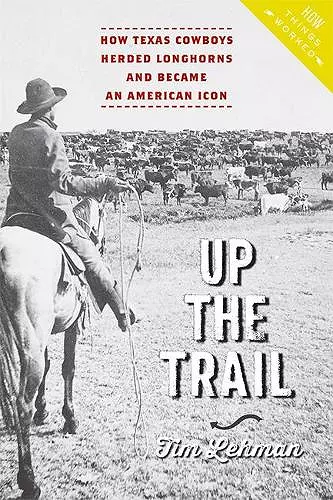Up the Trail
How Texas Cowboys Herded Longhorns and Became an American Icon
Format:Hardback
Publisher:Johns Hopkins University Press
Published:14th Aug '18
Currently unavailable, and unfortunately no date known when it will be back
This hardback is available in another edition too:
- Paperback£15.75was £17.50(9781421425900)

How did cattle drives come about—and why did the cowboy become an iconic American hero?
Cattle drives were the largest, longest, and ultimately the last of the great forced animal migrations in human history. Spilling out of Texas, they spread longhorns, cowboys, and the culture that roped the two together throughout the American West. In cities like Abilene, Dodge City, and Wichita, buyers paid off ranchers, ranchers paid off wranglers, and railroad lines took the cattle east to the packing plants of St. Louis and Chicago.
The cattle drives of our imagination are filled with colorful cowboys prodding and coaxing a line of bellowing animals along a dusty path through the wilderness. These sturdy cowhands always triumph over stampedes, swollen rivers, and bloodthirsty Indians to deliver their mighty-horned companions to market—but Tim Lehman’s Up the Trail reveals that the gritty reality was vastly different. Far from being rugged individualists, the actual cow herders were itinerant laborers—a proletariat on horseback who connected cattle from the remote prairies of Texas with the nation’s industrial slaughterhouses.
Lehman demystifies the cowboy life by describing the origins of the cattle drive and the extensive planning, complicated logistics, great skill, and good luck essential to getting the cows to market. He reveals how drives figured into the larger story of postwar economic development and traces the complex effects the cattle business had on the environment. He also explores how the premodern cowboy became a national hero who personified the manly virtues of rugged individualism and personal independence. Grounded in primary sources, this absorbing book takes advantage of recent scholarship on labor, race, gender, and the environment. The lively narrative will appeal to students of Texas and western history as well as anyone interested in cowboy culture.
Perhaps the most iconic panorama in western movies is the cattle drive, with vast numbers of bawling Texas longhorns fanning out to cross the wide Red River, herded by a small fraternity of loose-limbed, laconic cowboys on horseback. Read this scene through the lens of Tim Lehman's Up the Trail, and it looks quite different.
—Christine Bold, Times Literary Supplement
This concise synthesis of life on the nineteenth-century trail drives north from Texas is ideal for the general reader as well as students in Texas or western American history classes. Tim Lehman deftly brings the long drives to life, thanks to copious primary source quotations from nineteenth-century reminiscences, diaries, publications, and newspaper accounts . . . Up the Trail does an admirable job of taking readers behind the tall tales to see the real lives of real cowboys on the great cattle drives as well as showing their transition from history to mythology.
—Richard W. Slatta, North Carolina State University, Southwestern Historical Quarterly
In Up the Trail Tim Lehman provides an astute and . . . thorough history of the Texas cattle industry from its inception to the mid-1880s. Lehman ably traces the beginnings of the cattle trade, moving quickly and logically from Christopher Columbus's importation of cows in the late fifteenth century to the massing of large herds in the early nineteenth century. Lehman does a good job of showing us how this U.S.–defined and defining activity owed much to the those who were among the first cowboys.
—Stanley Corkin, University of Cincinnati, Journal of American History
From the dust and ashes of the trails rose an American icon, the cowboy. Lehman traces this transformation in cogent fashion, from the night-herd songs and poems, to the "dime novels," to the Hollywood "horse operas" of the early 1900s. Gone from this legend were the hardship, the cruelty, and the extreme toll exacted from the land, the stock, and the men of the trail drives that we are given glimpses of in this appealing book.
—Tim Keane, Kansas State University, Great Plains Quarterly
ISBN: 9781421425894
Dimensions: 229mm x 152mm x 18mm
Weight: 363g
184 pages